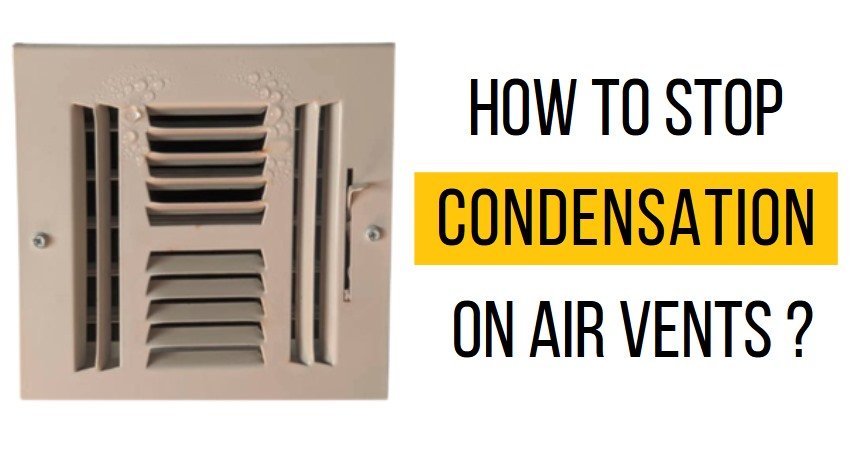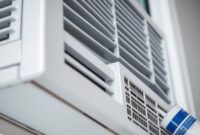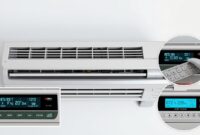Understanding how to stop condensation on air vents from forming on air ducts is essential since, if ignored, ductwork sweating can result in catastrophic damage.
It doesn’t sound enjoyable when condensation forms on AC ducts. However, it isn’t usually the end of the world for the priceless life of your air conditioner.
The problem of condensation dripping from ceiling vents is one that almost all homes experience. Fortunately, fixing it is also quite simple. But first, let’s explore what ductwork sweating is and what causes it before we discuss how to stop moisture from forming on air ducts.

Read also: What Causes Condensation on AC Vents?
What Is Air Conditioner Ductwork?
The network of ducts in your air conditioner delivers conditioned air from your central air conditioning system throughout your house. This network moves air from the air vents to the primary air conditioner or heater and back again.
Your home’s ducts are fiberboard, fiberglass, or sheet metal. Knowing the type of ducts in your home is crucial since it might determine whether or not you need to be concerned about ductwork sweating.
Older homes generally have a metal ductwork system. Some might have a flexible type of ductwork. Ductwork sweating is more likely to occur on metal ductwork, especially if they aren’t adequately insulated.
However, flexible ducts aren’t entirely safe either. Before we explain why, let’s first talk about what condensation is.
How To Stop Condensation On Air Vents
There are several components you need to control if you want to reduce condensation on your AC vents. You have to control your ducts’ temperature, the temperature in your attic, and the humidity levels in your home.
- Your air ducts’ surrounding humidity should be lower. Keep ducts apart so that air may pass through them. Cover the dirt in the crawlspace beneath your home if there are ducts to cut down on dampness. Make sure the space is well insulated, and seal any cracks or holes if they are in your attic. A dehumidifier helps keep the air surrounding your ductwork dry if you live in a frequently humid area.
- Clear any ducts obstructing air movement, which should be cleaned often. The chance of ductwork sweating rises when the air in your A/C system cannot freely move since it will get cooler inside some ducts.
- Clean and replace your air filters often. It is advised to change filters every one to three months. Still, you may also adhere to the recommendations for the air filter you buy. For example, you might need to change the filter more frequently if you have pets or someone in your household suffers from a dust allergy.
- The next step to stop condensation on air vents is fixing ducts dripping. Condensation will form more frequently the more cold air that escapes. A leaky duct can be found using a pressure gauge or simply touching the duct.
Maintaining indoor air quality is important for a comfortable living environment, and one of the issues that can impact it is excessive moisture, which can lead to condensation on air vents and potentially promote the growth of mold and bacteria.
Condensation Dripping From Ceiling Vent
If you’ve attempted to troubleshoot the offenders above, your issue may be a refrigerant leak. In general, a refrigerant leak will cause less water to spill than a blocked condensate drain. But, like how a clogged air filter causes AC vents to leak water, refrigerant leaks do the same.
Low refrigerant levels prevent your AC system from effectively removing humidity from the air inside.
When water droplets on the air vent from the air and left on the evaporator coils for too long, they may freeze over. Condensation can drop from ceiling AC vents as it melts.
An air conditioner that drips water and has limited airflow or air that doesn’t feel as cold as it should be most likely suffering from a refrigerant leak. No one ever anticipates low refrigerant levels. Exposure to refrigerant can be dangerous, so you should always call a qualified HVAC technician.
Final Advice For How To Prevent Condensation On AC Ducts
Allowing the issue of how to stop condensation on air vents to persist might severely harm your house and HVAC system. However, a home warranty might be helpful if you need assistance paying for AC repairs or system replacement.
You can keep your air conditioner functioning efficiently for a more extended time with a service contract, which should aid in lowering the condensation it produces. Additionally, covered by home warranties are expensive systems like ducting.


